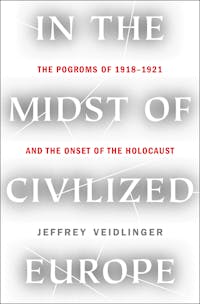Jeffrey Veidlinger is the award-winning author of numerous books, including In the Midst of Civilized Europe: The 1918-1921 Pogroms in Ukraine and the Onset of the Holocaust. He is Joseph Brodsky Collegiate Professor of History and Judaic Studies at the University of Michigan, where he teaches courses on the Holocaust, antisemitism, and Jewish history. He lectures widely on the Holocaust, antisemitism, and Jewish affairs.
Jeffrey Veidlinger is the chair of the Academic Advisory Council of the Center for Jewish History, a member of the Executive Committee of the American Academy for Jewish Research, a member of the Academic Committee of the United States Holocaust Memorial Museum, and a former vice-president of the Association for Jewish Studies. He is the former director of both the Frankel Center for Judaic Studies at the University of Michigan and the Borns Jewish Studies Program at Indiana University.
Born in Toronto, Canada, he completed his BA at McGill University and his PhD at Georgetown. He lives in Ann Arbor, Michigan.
Download Bio
 HARDCOVER
|
In the Midst of Civilized EuropeThe Pogroms of 1918–1921 and the Onset of the Holocaust
Metropolitan Books
Between 1918 and 1921, over a hundred thousand Jews were murdered in Ukraine by peasants, townsmen, and soldiers who blamed the Jews for the turmoil of the Russian Revolution. Drawing upon long-neglected archival materials, including thousands of newly discovered witness testimonies, trial records, and official orders, acclaimed historian Jeffrey Veidlinger shows for the first time how this wave of genocidal violence created the conditions for the Holocaust. |
Drawing upon long-neglected archival materials, including thousands of newly discovered witness testimonies, trial records, and official orders, acclaimed historian Jeffrey Veidlinger shows how this wave of genocidal violence created the conditions for the Holocaust. Through stories of survivors, perpetrators, aid workers, and governmental officials, he explains how so many different groups of people came to the same conclusion: that killing Jews was an acceptable response to their various problems.
Great Minds Think Alike: The Persistence of Jewish Stereotypes in Western Thought From Moses the lawgiver to Madoff the shyster, Jews have figured prominently in European and American myth for some two thousand years. Regardless of whether it is out of admiration for their contributions to modern civilization or as a warning about imagined Jewish conspiracies, stereotypes of Jews have occupied some of the most influential minds of the last two centuries. Some have lauded them as God’s Chosen People, Hollywood moguls, Nobel Laureates, intellectual geniuses, and highly accomplished doctors, lawyers, and professionals. At the same time stereotypes of Jews have been feared and despised as imagined worshippers of the Anti-Christ, political conspirators, financial manipulators, child murderers, and threats to racial purity. This talk looks at how positive and negative stereotypes and misconceptions about Jews influenced some major writers and artists of the past, including William Shakespeare, Charles Dickens, Karl Marx, Fyodor Dostoevsky, George Eliot, and Mark Twain.
Antisemitism and the College Campus Based on his experiences running two of the largest Jewish Studies college programs in the country, as well as his time as Vice-President of the Association for Jewish Studies and Chair of the Academic Council of the Center for Jewish History, Professor Veidlinger reflects on the current state of Jewish life and antisemitism on college campuses.
Voices from the Shtetl In this presentation, featuring video of Yiddish-language survivor testimonies he recorded in Ukraine, Professor Veidlinger shares powerful stories about retaining faith and identity in the harshest of circumstances, about surviving the Holocaust and Communism, and about rebuilding life in the aftermath of tragedy.
Tell me About your Life Based on his TedX Talk, Professor Veidlinger shares some of the wisdom he has learned from the elderly folks he interviewed during ten years of oral history research. The talk gives practical advice on the methods and benefits of listening to and recording life stories and encourages individuals to conduct their own oral histories with family members, to listen, to learn, and to try to understand what matters most to those they love.
Read about Jeffrey Veidlinger’s interview with “The Israel Times”.
—Timothy Snyder, author of

